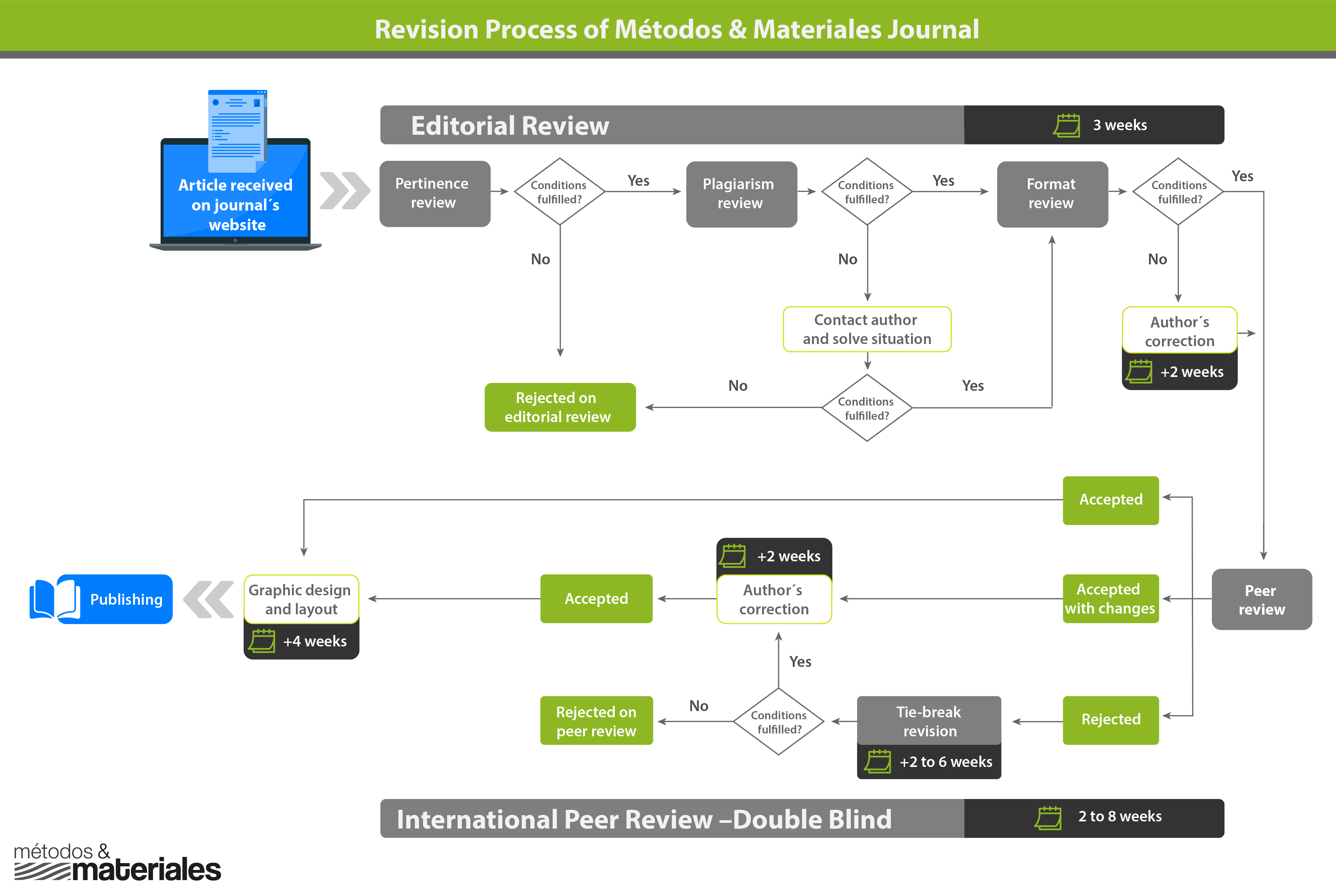Focus and Scope
Métodos y Materiales is a scientific journal born on the National Materials and Structural Models Laboratory of the University of Costa Rica (LanammeUCR). Its objective is the scientific production acquired and the research carried out in:
- Test methods
- Construction materials
- Civil engineering applied technologies
It is aimed at researchers, teachers, professionals and students on civil engineering. Selection criteria for manuscripts are the quality, amount of new information, and interest to a general readership.
Publication Frequency
The journal Métodos & Materiales has a continuous publication (rolling pass). The publishing period is January-December. New articles will be added to our Table of Contents of the current number as soon as they are ready to be published.
Peer Review Process

The following procedure is used to select those articles that are published:
- The author must upload the article to the OJS system (Open Journal System), from the journal page of the University of Costa Rica. "http: // revistas.ucr.ac.cr/ index.php / materials".
- Review by the Editorial Board according to the following criteria:
- Scientific quality and originality
- Information related to the objective and main themes of the journal
- Compliance with the author rules specified by the journal
- Consistency of the method proposed
- The articles will be evaluated through the peer review and double blind system. This evaluation is carried out by specialists external to the Journal, both national and international, promoting the anonymity of the authors and reviewers during the review, within a minimum period of 2 weeks.
- Once the document is reviewed, the following faults will be established:
- Accepted, it is published
- Accepted with changes, it is published only if changes are made
- Rejected, not published
- The direcction of the journal will decide, in case there is disagreement on the criteria issued on the acceptance of the article.
- If the article is "accepted with changes" the author or authors will be notified to make the adjustments. The authors must send the new revised version of the article and the Editorial Board proceeds to make a final revision of it, within a maximum period of 2 weeks.
- The Editorial Board will choose the articles that will be published in each edition.
- The total duration of the document evaluation process, from the time it´'s received until its acceptance, is of approximately 30 weeks.
Ethical Requirements
The journal ensures compliance with international ethical criteria in the publication of its articles, which includes all those involved in the editorial process. To achieve this ethical standard, the journal relies on similar criteria from the established in the international standards of the Committee on Publication Ethics (COPE).
The participants' own responsibilities are:
- Editors: will be aware of standards, review methods and article publication processes. They will supervise that the articles are reviewed by suitable pairs for the process, so that anomalous situations can be detected in terms of ethical dispositions and plagiarism.
- Authors: they must submit completely original research with the results of rigorous research processes without neglecting ethics. Describe in detail the methods used in the development of the research so that these can be corroborated by interested readers. They should not send, simultaneously, manuscripts to other journals for them to be evaluated. They must disclose the sources of information on which they were based to develop the research, the funding entities and conflicts of interest, if any.
- Reviewers: expert and specialized peers will evaluate the articles in an objective, rigorous manner and in the time that has been established. They must commit themselves to communicate the possible frauds or plagiarism of the investigations in the evaluation process. If an article is rejected, the reasons why it has been rejected shall be indicated specifically, or suggestions shall be made that may improve the quality of the article.
If required and after a verified ethical failure, the Journal reserves its right to reject or recant an article and give further clarifications.
Plagiarism Detection
The journal uses the Turnitin system to detect textual copies that have not been referenced to their source. This system analyzes the documents provided for preliminary review against the material available on the internet. All material sent in which plagiarism is detected, will be rejected.
Originality Requirement
Completely original research must be submitted, with the results of rigorous research processes.
Responsibility
The opinions and facts consigned in each article are the exclusive responsibility of the authors.
Open Access Policy
This journal is open access therefore, its content is free. Users can read, download, store, print and link to the full publications, as long as it is not for commercial purposes.
Digital Preservation Policies
This journal has access to 2 data servers of 196 TB capacity each, the information is stored on a server and also a weekly backup is made in the other unit. These servers are located in restricted access area with continuous supply of electric power plant and UPS batteries. In addition, digital access to information is limited to the journal's editing team only. Coupled with this, we have the support of the LOCKSS platform through the Portal de Revistas Académicas de la UCR to complement the backup.
Copyrights
The journal Métodos y Materiales has Creative Commons license of Recognition - Non-commercial - No derivative work. That is, the commercial use of the original work or the generation of derivative works is not allowed.
Métodos y Materiales by LanammeUCR is distributed under a Creative Commons Attribution-NonCommercial-NoDerivative 4.0 International License


